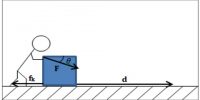A thermodynamic process is said to be reversible process when
(i) the various stages of an operation to which it is subjected can be reversed in the opposite direction and in the reverse order and
(ii) in every part of the process, the amount of energy transferred in the form of heat or work is the same in magnitude in either direction. At every stage of the process there is no loss of energy due to friction, in-elasticity, resistance, viscosity etc. The heat losses to the surroundings by conduction, convection or radiation are also zero.
Condition for reversible process
(i) The process must be infinitely slow.
(ii) The system should remain in thermal equilibrium (i.e.) system and surrounding should remain at the same temperature.
Examples:
(a) Let a gas be compressed isothermally so that heat generated is conducted away to the surrounding. When it is allowed to expand in the same small equal steps, the temperature falls but the system takes up the heat from the surrounding and maintains its temperature.
(b) Electrolysis can be regarded as reversible process, provided there is no internal resistance.















